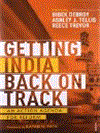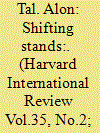| Srl | Item |
| 1 |
ID:
132871


|
|
|
|
|
| Publication |
Gurgaon, Random House India, 2014.
|
| Description |
xii, 333p.Hbk
|
| Standard Number |
9788184005691
|
|
|
|
|
|
|
|
|
|
|
|
Copies: C:1/I:0,R:0,Q:0
Circulation
| Accession# | Call# | Current Location | Status | Policy | Location |
| 057860 | 330.954/DEB 057860 | Main | On Shelf | General | |
|
|
|
|
| 2 |
ID:
124936


|
|
|
|
|
| Publication |
2013.
|
| Summary/Abstract |
The contestation and appropriation of water is not new, but it has been highlighted by recent global debates on land grabbing. Water grabbing takes place in a field that is locally and globally plural-legal. Formal law has been fostering both land and water grabs but formal water and land management have been separated from each other-an institutional void that makes encroachment even easier. Ambiguous processes of global water and land governance have increased local-level uncertainties and complexities that powerful players can navigate, making them into mechanisms of exclusion of poor and marginalised people. As in formal land management corporate influence has grown. For less powerful players resolving ambiguities in conflicting regulatory frameworks may require tipping the balance towards the most congenial. Yet, compared with land governance, global water governance is less contested from an equity and water justice perspective, even though land is fixed, while water is fluid and part of the hydrological cycle; therefore water grabbing potentially affects greater numbers of diverse water users. Water grabbing can be a powerful entry point for the contestation needed to build counterweights to the neoliberal, corporate business-led convergence in global resource governance discourses and processes. Elaborating a human right to water in response to water grabbing is urgently needed.
|
|
|
|
|
|
|
|
|
|
|
|
|
|
|
|
| 3 |
ID:
125303


|
|
|
|
|
| Publication |
2013.
|
| Summary/Abstract |
While the Middle East is frequently in the news because of political volatility and violence, there is an underlying lack of environmental equilibrium that poses a comparable threat to regional stability. Israel's neighbors--Egypt, Jordan, and Palestine--are arid countries with limited natural carrying capacity and burgeoning populations. Providing food and employment in what were traditionally agrarian economies has contributed to significant depletion of soil and water resources. Israel's experience as an innovator in technologically intensive dryland agriculture and forestry is entirely different. Yet it is not clear whether the grand Israeli experiment in water management and combating of desertification offers a compelling alternative model to its neighbors should diplomatic breakthroughs pave the way for transboundary cooperation. Not only are the socioeconomic and cultural circumstances entirely different, but the sustainability of some of Israel's unique management practices remains questionable.
|
|
|
|
|
|
|
|
|
|
|
|
|
|
|
|